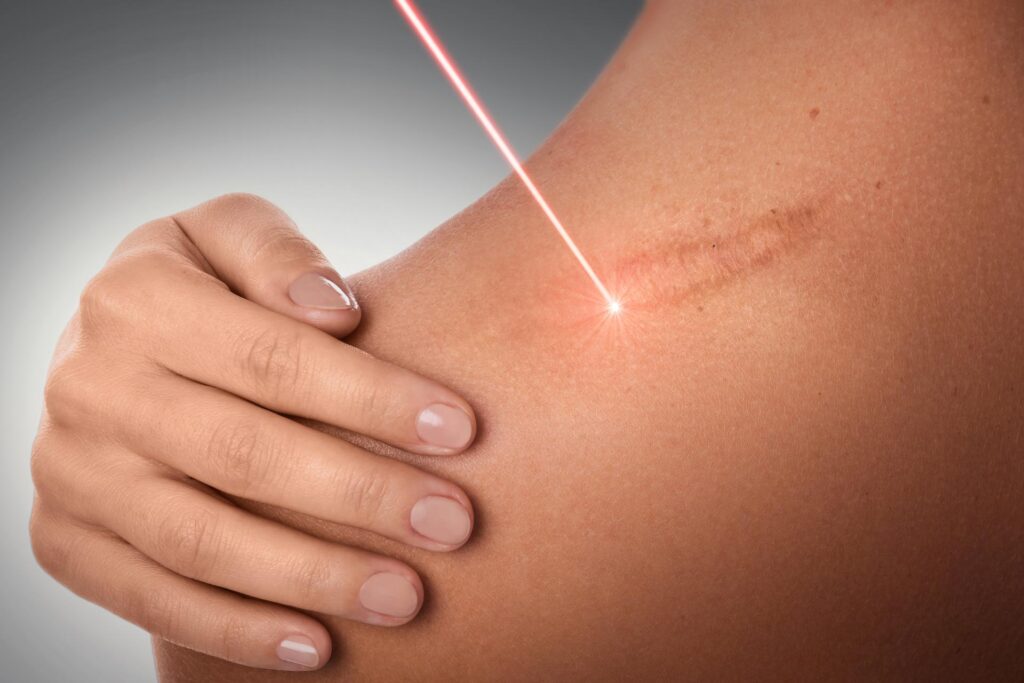What Scars Can Laser Treatments Help Fade?
Whether they remind you of a childhood fall, an old acne breakout, or a surgical incision, scars can linger long after the initial wound has healed. While some fade over time, others remain more prominent, affecting your confidence and skin texture. Fortunately, laser treatments have made incredible strides in minimizing the appearance of scars.
How Does Laser Treatment for Scars Work?
Laser treatments for scars, also known as laser scar revision, use light energy to target damaged or scarred skin tissue while stimulating the body’s natural healing response. The laser gently penetrates the skin to encourage collagen remodeling, which helps smooth out texture irregularities and fade discoloration. Over time, this process softens the appearance of scars and promotes healthier, more even-toned skin.
What Types of Scars Can Laser Treatments Help Fade?
Scars vary in shape, size, texture, and cause, and not all scars respond to the same treatment. Fortunately, laser technology has evolved to address a wide range of scar types with precision and care.
Whether your scar is flat, raised, discolored, or deeply pitted, laser scar revision can help improve its appearance by encouraging smoother skin and more even tone. Below are the most common types of scars that can benefit from laser treatment:
Acne Scars
Acne scars are among the most frequently treated with laser therapy. These can include:
- Boxcar scars – broad, shallow depressions with defined edges
- Rolling scars – soft, wave-like indentations
- Ice pick scars – deep, narrow scars that resemble enlarged pores
Laser treatments stimulate collagen production in the affected areas, gradually filling in depressions and evening out the texture over time.
Surgical Scars
Surgical incisions often leave visible lines, especially if the skin heals with uneven texture or discoloration. Laser treatments can reduce the contrast between scar tissue and surrounding skin, smooth out rough areas, and help the scar blend more seamlessly, particularly when performed after the scar has fully healed.
Injury or Trauma Scars
Scars from accidents or injuries can vary widely in appearance, often resulting in raised or discolored skin. Depending on the depth and age of the scar, laser therapy can help break down excess scar tissue and promote regeneration, softening the texture and minimizing the scar’s visibility.
Hypertrophic Scars
These are raised, thickened scars that stay within the boundaries of the original wound. They can be red, itchy, and uncomfortable. Laser treatments help reduce excess collagen buildup, calm inflammation, flatten the scar, and improve its color and texture over time.
Stretch Marks
Although not traditional scars, stretch marks are dermal scarring caused by rapid stretching or shrinking of the skin, often during pregnancy, puberty, or weight changes. Laser therapy can reduce redness, improve skin texture, and support collagen remodeling, making stretch marks less visible and more even with your natural skin tone.
What Should You Expect from Laser Scar Treatments?
Laser scar revision is a straightforward, in-office procedure that typically involves minimal discomfort and little to no downtime. Your experience begins with a consultation, where your provider will assess the type and severity of your scar, discuss your goals, and determine whether laser treatment is the best option for your skin.
During the procedure, the targeted area will be cleansed and prepped. Protective eyewear is provided, and while numbing cream isn’t always necessary, it may be used to enhance comfort. The laser device delivers controlled energy pulses to the skin, which may feel like a mild snapping or warming sensation. Treatment time usually ranges from 15 to 45 minutes, depending on the size and location of the scar.
After treatment, it’s normal to experience some temporary redness, swelling, or a slight sunburn-like sensation. These effects typically subside within a few days. You’ll be given aftercare instructions, such as avoiding sun exposure and using gentle skincare products.
Most patients see noticeable improvement after a few sessions, with optimal results developing over time as collagen production increases and the skin continues to heal and renew itself.
Are Laser Scar Treatments Right for You?
Laser scar revision is suitable for many people. Still, individual results depend on several factors, including the type of scar, how long you’ve had it, your skin tone, and overall skin health. The best candidates typically have fully healed scars, healthy skin in the surrounding area, and realistic expectations about the process and outcomes.
While laser treatment can improve the appearance of most scars, it may not completely erase them. Instead, the goal is to soften their texture, even out pigmentation, and reduce their visibility. The degree of improvement varies from person to person, and older or deeper scars may require more sessions.
People with active infections, open wounds, or certain skin conditions may need to delay treatment or explore alternative options. Similarly, darker skin tones may require more customized laser settings to reduce the risk of hyperpigmentation.
A consultation is the best way to determine if laser scar revision suits you. Our team will assess your skin, review your goals, and recommend the safest and most effective approach to help you feel more confident in your skin.
Reveal Smoother Skin with Laser Scar Treatments
At New England Cosmetic Surgery & Laser Center in Weymouth, MA, we offer advanced laser scar revision treatments tailored to your skin and your goals. Our technology works beneath the skin’s surface to stimulate collagen production, soften scar tissue, and restore a smoother, more even skin tone—all with minimal discomfort and little to no downtime.Whether you’re struggling with acne scars, surgical scars, trauma-related marks, or stretch marks, we’re here to help you feel better in your skin. Contact us online or call (781) 337-5665 today to schedule your personalized consultation.


